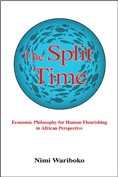

The Split Time: Economic Philosophy for Human Flourishing in African Perspective
Aims to construct an economic philosophy from indigenous African thought.
The quest for economic development is arguably the most frustrating and tragic dimension of human existence in Africa. As its primary task, The Split Time constructs an economic philosophy from a tradition of thought that is indigenous to Africa, arguing that there are long-neglected resources within African philosophy to guide economic policymakers toward creating an African economy that can sustain human flourishing. Exploring notions of destiny, temporality, and desire, Nimi Wariboko constructs an economic-philosophical framework to rethink solutions to the vexing problem of economic development in Africa. He also provides a robust social-ethical perspective in which the basic aspects of economic life—the agential (accounts of human agency, telos), the circumstantial (material/social context), and the affective (to feel appropriately what matters to a people in an economy or their desire for human flourishing)—come together to fire social imagination about development policies for the common good.
"Rigorously researched, The Split Time boldly poses urgent questions about the continued absence of economic development in a Nigerian African context. Nimi Wariboko's inimitable style—direct, logical, rhythmic, and compelling—enhances his perceptive mobilization of resources from 'indigenous economic philosophy.' The book's broad interdisciplinarity is a particular strength, advancing scholarship in interrelated fields ranging from theology and psychology to African studies." — Ebenezer Obadare, author of Pentecostal Republic: Religion and the Struggle for State Power in Nigeria
"Wariboko's compelling prescription for Africa's long-running underdevelopment syndrome centers on indigenous ideology and practices, allowing readers to savor a uniquely native system for bringing the African people to the much desired but elusive economic paradise." — Raphael Chijioke Njoku, author of West African Masking Traditions and Diaspora Masquerade Carnivals: History, Memory, and Transnationalism
The quest for economic development is arguably the most frustrating and tragic dimension of human existence in Africa. As its primary task, The Split Time constructs an economic philosophy from a tradition of thought that is indigenous to Africa, arguing that there are long-neglected resources within African philosophy to guide economic policymakers toward creating an African economy that can sustain human flourishing. Exploring notions of destiny, temporality, and desire, Nimi Wariboko constructs an economic-philosophical framework to rethink solutions to the vexing problem of economic development in Africa. He also provides a robust social-ethical perspective in which the basic aspects of economic life—the agential (accounts of human agency, telos), the circumstantial (material/social context), and the affective (to feel appropriately what matters to a people in an economy or their desire for human flourishing)—come together to fire social imagination about development policies for the common good.
"Rigorously researched, The Split Time boldly poses urgent questions about the continued absence of economic development in a Nigerian African context. Nimi Wariboko's inimitable style—direct, logical, rhythmic, and compelling—enhances his perceptive mobilization of resources from 'indigenous economic philosophy.' The book's broad interdisciplinarity is a particular strength, advancing scholarship in interrelated fields ranging from theology and psychology to African studies." — Ebenezer Obadare, author of Pentecostal Republic: Religion and the Struggle for State Power in Nigeria
"Wariboko's compelling prescription for Africa's long-running underdevelopment syndrome centers on indigenous ideology and practices, allowing readers to savor a uniquely native system for bringing the African people to the much desired but elusive economic paradise." — Raphael Chijioke Njoku, author of West African Masking Traditions and Diaspora Masquerade Carnivals: History, Memory, and Transnationalism
Publisher
State University of New York Press
Publication Date
8/1/2022
ISBN
9781438489797
Pages
246
Categories
Questions & Answers
Reader Reviews
Loading comments...